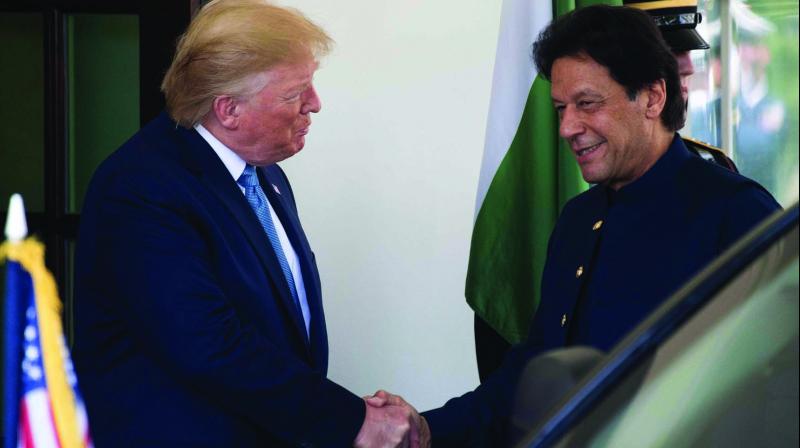Afghan, Hafiz arrest behind thaw in Pak ties with US

It was a meeting between two unpredictable leaders and they seem to have struck a chord. Putting behind the bitterness of the Twitter war that the two had engaged in previously, President Donald Trump and Prime Minister Imran Khan have found some common ground to move forward on.
This week’s summit talks in Washington have broken the ice, putting back on track a mainly transactional relationship between the two erstwhile allies. It’s once again the lingering Afghan crisis that has brought them together.
Predictably, the talks at the White House revolved around Afghanistan and regional security. It was quite significant that for the first time the military leadership of both sides participated in deliberations, reinforcing the perception that it mainly remains a security-oriented relationship.
It’s an interesting development that the Trump administration now sees Pakistan more as part of the solution than the cause of the problem in Afghanistan. And Pakistan is happy to cooperate in return for an assurance that its national security concerns will be addressed. There is, indeed, a convergence of interest, notwithstanding the huge trust deficit between the two countries.
Surely, relations between Washington and Islamabad, as Trump said, are “much better now than before”. But it still remains tenuous given the existing strategic divergence. One positive point was that there was no “do more” mantra from the US side this time.
One of the reasons for the change in the environment was Pakistan’s crackdown on militant groups, especially the arrest of Hafiz Saeed under terrorism laws on the eve of the visit. The US had placed a $10 million bounty on the head of the founder of the banned Lashkar-e-Taiba.
Trump’s remarks at the joint presser mark a welcome change from his earlier vitriolic statements that held Pakistan responsible for the worsening Afghan conflict. He now believes that Pakistan can save “millions of lives in Afghanistan” because “they have a power that other nations don’t have with respect to Afghanistan”. In other words, the Trump administration needs Pakistan’s support to extricate itself from a festering war that the US has never been able to win.
Undoubtedly, Pakistan has played a very important role in facilitating peace negotiations between the US and the Afghan Taliban, that have shown significant progress; the effort has been duly acknowledged by the US president. But a major question is whether Pakistan can meet American expectations. Although Imran Khan is hopeful that the Taliban can be persuaded to talk to the Kabul government in the coming days, there is still no indication of the insurgents softening their stance. To get the Taliban to agree to a ceasefire would be a major challenge for Pakistan. It will surely be a huge stride forward towards a political settlement in Afghanistan.
Trump’s comments about Kashmir too indicate his administration’s changing stance over a lingering problem that is causing instability in South Asia. But his offer of mediation in the dispute seemed more of an off-the-cuff remark than a serious proposition. Pakistan has always supported third-party arbitration, but India has never approved any such suggestion.
So the hysterical Indian response to Trump’s comments is not surprising. Yet one would like to know what the Indian prime minister really told the US president in their meeting on the sidelines of the G-20 summit in Osaka last month. There must have been some discussion there about Pakistan-India tensions that Trump was referring to. According to the US president, Prime Minister Narendra Modi asked him, “Would you like to be a mediator?” It will be interesting to know what exactly the Indian prime minister meant.
It was, however, extremely important for Imran Khan to highlight the Kashmir dispute that has made the region a potential nuclear flashpoint. It is imperative to make the US administration realise that Afghan peace is also linked to the lowering of tensions between Pakistan and India. The US may not be able to mediate on Kashmir, but as Imran Khan said, Washington can play “the most important role in bringing peace to the subcontinent”.
Improving trade and economic relations was another key subject discussed in Washington. The resumption of US aid may not be a major concern for Pakistan’s Prime Minister; investment and economic cooperation figured more importantly in the meetings. The American president, too, seemed interested in increasing US investment. Pakistan needs US help to stave off the looming threat of being blacklisted by the Paris-based terror-financing watchdog FATF. In June 2018, Pakistan was placed on the grey list due to its ‘strategic deficiencies’ in the anti-money-laundering and terrorism-financing regime pushed by the US. Pakistan missed its May 2019 deadline, one which required the country to keep terror financing and money laundering in check. Now Pakistan is required to swiftly implement its action plan by October this year.
Indeed, the Prime Minister’s visit to Washington has helped thaw Pakistan’s relations with the US. But there have also been some sore points. Undoubtedly, the huge rally of Pakistani Americans in Washington was a testimony of support for Imran Khan among the expatriates. However, his speech threatening opposition leaders was unbecoming of a leader representing the country. What Khan does not understand is that no foreign policy can be successful without political stability at home.
By arrangement with Dawn

